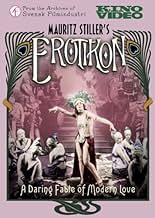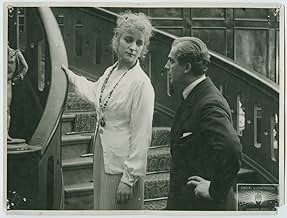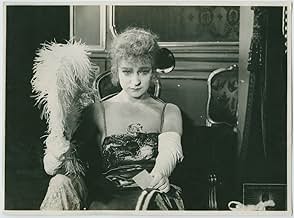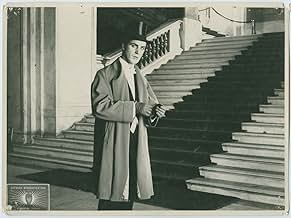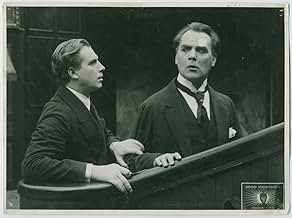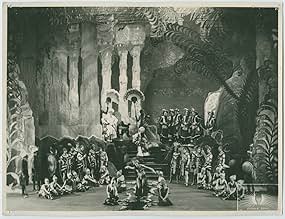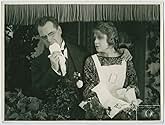Agrega una trama en tu idiomaEROTIKON surely pushed the boundaries of what was acceptable on the screen in 1920: Irene, the bored wife of a distracted entomologist, pursues a womanizing aviator, but she may actually be ... Leer todoEROTIKON surely pushed the boundaries of what was acceptable on the screen in 1920: Irene, the bored wife of a distracted entomologist, pursues a womanizing aviator, but she may actually be in love with Preben, her husband's best friend. Meanwhile, her husband seems to be getting... Leer todoEROTIKON surely pushed the boundaries of what was acceptable on the screen in 1920: Irene, the bored wife of a distracted entomologist, pursues a womanizing aviator, but she may actually be in love with Preben, her husband's best friend. Meanwhile, her husband seems to be getting unusually close with his own niece. Stiller obviously delights in teasing his audience wi... Leer todo
- Dirección
- Guionistas
- Elenco
Opiniones destacadas
The DVD release's jacket does a mild disservice to Mauritz Stiller's Erotikon (1920) by stating that its slyly sardonic approach to sexual intrigue inspired Ernst Lubitsch. As the only Lubitsch film I've seen that predates Erotikon is the preposterous and galumphing Eyes of the Mummy, I'm prepared to accept that Lubitsch had a significant epiphany that helped him become the sort of filmmaker who could make The Marriage Circle. But the expectation is thus set that Erotikon will have an effervescent comic pace and a constantly winking eye like a Lubitsch film of the 30s-- and that is not the case.
A better touchstone for the film is The Rules of the Game (not least because an aviator plays so prominent a role), a movie which observes, with the sad empathy of a veteran priest with many Saturdays spent listening to confession behind him, the desperate efforts of a group of humans to chase after happiness-- only to make things worse in most cases. Erotikon begins with a fussy middle-aged professor lecturing on bigamous beetles (oddly anticipating the recent movie biography of Dr. Kinsey), and takes a consciously scientific detachment toward its characters as they scurry about, trying to keep mortality at bay by finding some form of erotic excitement in lives which are a bit too settled, under-occupied and, it appears, sexually frustrated. A comedy, yes, and even one that wraps up in high spirits, and yet a comedy that's touched throughout by melancholy, and played with a sort of gravity and a deliberate pace that gives us time to feel the hurt under the surface.
Or so it seemed to me when I watched it tonight. Then I watched the "intro" by the film scholar Peter Cowie, and learned that Erotikon is quite the opposite. Unlike Smiles of a Summer Night, another obvious comparison, Erotikon's comedy does not have a moralistic melancholy undertone, says Cowie. What struck me as gravity, like Preston Sturges slowed down to Douglas Sirk if not Carl Dreyer, strikes Cowie as "frothy."
How to account for the fact that Cowie sees a completely different Erotikon than I do? Well, for one thing, I suppose he has far more experience of Scandinavian cinema on which to build his preconceptions; next to a diet of Sjostrom, Bergman, Strindberg and Hamsun, Erotikon IS frothy, I'm sure. And I doubt he had seen it, the first few times at least, with the particular score on this DVD, a Celtic dirge that seems to belong to a production of "The Death of Cuchulain" more than it does to a 1920s drawing room comedy; it certainly puts the film in a dourer key than a conventional romantic comedy score would have. Maybe I'll try watching it again with something peppier, and see if it's a different movie.
Adding to the uncertainty of tone is the fact that the film contains a wide variety of acting styles. Tora Teje (as the socialite wife) and Lars Hanson (as the sculptor) are highly effective in a theatrical, heightened-naturalism sort of way, while Anders de Wahl as the husband and especially Torsten Hammaren as an aged professor who seems to be the Swedish answer to Mr. Muckle in It's a Gift are caricatures of woolly-headed academia. It's a bit like Deborah Kerr in Bonjour Tristesse being married to Fred MacMurray in The Absent-Minded Professor.
Despite this mismatch-- perhaps to be expected in such a trailblazing comedy with no apparent models to follow, other than its stage original-- Erotikon is a striking and interesting film, one of the few silents that seems to leap out of the period, untouched by the customary moralizing Victorian preconceptions of what is proper behavior for its characters (and proper punishment for those who violate it). Erotikon simply observes what these creatures do naturally; applying morals to them would be self-delusion, and Erotikon is a movie largely free of illusions.
Mauritz Stiller's movie should be familiar to film buffs who like Demille; the set-up is very much like the social comedies he was making at the time, minus the Christian ending and the lavish flashbacks -- although there is a sequence dropped in, in which they are all at the ballet watching a piece about a woman who wants to have a fling with her husband's best friend. The camerawork is not as lavish, but the editing is so good that the movie moves along smoothly, with never a bump when it takes an unexpected turn.
The ultimate unexpected turn is that it's all right. In the end, everyone still likes everyone else, but there's no message about this is the way things are supposed to be, forever and amen. Sometimes we make mistakes, and if we can fix them, everyone will be happier. Of course Stiller chooses his details carefully so his message is reinforced, but that's an artist's prerogative. He certainly has a movie here that, as de Wahl remarks, agrees with the movie-going public: a happy ending for all.
The content of EROTIKON is seemingly simple and refers mostly to the relations, or better said 'inter-relations' among people. Yet, we have to realize that the film is being seen nowadays from the entirely different perspective with the entirely new vision of certain aspects. Naturally, even the things we expect in a comedy changed. Any silent film is, of course, being seen differently. When we consider the content regarding this very knowledge, EROTIKON occurs to be revolutionary, much ahead of its time. Stiller proves to be extremely open to modern thinking and, as a result, he becomes a milestone in the later trends in cinema. Certain notions on marriage, on the place of women in society, on the superiority of feelings to old, dusted regulations are particularly modern and appealing to an average movie buff nowadays. Here, the open minded thinking is so fresh, so unique, so absorbing though the film is, paradoxically, almost a century old. Why? Because EROTIKON is no preacher of what the things should be like but places the characters in the superior positions.
Since the characters make for the story, it is thanks to them that we enjoy the film. A few people are in the lead and...their emotions, desires, dreams seem to achieve their intensity and climax at the end. This is Professor Leo (Anders De Wahl). Most professors are famous for their researches and it depends, of course, what they research on...Leo's researches are quite peculiar...their subject are the beetles. He is a book buff, a calm man who loves very concrete schedule and takes life rather optimistically. Being naive in erotic tensions here and there, he skips certain desires around. Yet, he detests one thing: dramatic endings. His wife, Irene (Tora Teje) is a character worth consideration. She is a sort of prototype of a modern woman, independent of her husband, a woman who has a clear idea of what to do with life once giving a furrier a lesson of patience, another time traveling with a 'new Ikar' by helicopter, Baron Felix. Played by Tora Teje, she is given some marvelous moments of humor. Consider her waving at the husband or flirting scenes. Then comes a young, youthful, pretty, enthusiastic Marte (Karin Molander), a sweetie who loves sweets, a character who represents a light-hearted glimpse of a young girl: listening curiously to Professor's lecture on beetles' sexual life at the door, smoking a cigarette when the guests have left, making certain sensual moves meant to arouse men. She surprises us most at the end... Finally comes Preben (Lars Hanson), the best friend of the professor who has a crush on Irene...he appears to be fluent, more aware of life, sophisticated and burning within, burning with desire. Wonderfully portrayed by Lars Hanson, the actor who later became famous in Hollywood, the character of Prebel is very clear and memorable.
Those four characters supply us with wonderful tension that you will never forget. Their plots are so strongly linked to the strange fate of Shah and his wife in the Schaname that the opera sequence makes a perfect sense in the movie.
When seeing EROTIKON one may notice many other innovations, artistic features that played such a decisive role in Stiller's productions. For the director who had an unbelievable flair for beauty, the film could not come out with the lack of elegant wardrobe, wonderful sets, stunning visuals, catchy close-ups, fluent camera work and the technologically modern (for the time) stimuli like phones in a car and a helicopter. It all adds a certain amount of artistic pleasure and makes EROTIKON a valuable, enjoyable movie.
There is, moreover, one more aspect I would like to add when considering the artistic aspect. It is the great job done by Alva Lindbohm Lundin and the whole aesthetics and creativity in the subtitles. The pictures, created by her in the Svensk Filmindustrie, include birds chirping as the symbol of flirting or a question mark between the hearts symbolizing the dilemma who loves whom. These are just a few among the whole chain of wonderful ideas.
Some people will perhaps say that there are many elements of American cinema...true to a certain extent...like modern music often models upon immortal classical pieces, the same has occurred to happen in cinema...EROTIKON is a highly recommended film as an authentic presentation of certain aspects, as a tribute to feelings that should reign our acts, as the beautiful song "Jeg Elsker Dig" (I love you) that mysteriously showed the characters the paths they should take. A brilliant silent film!
Charpentier's niece Marthe ( Karin Molander ) secretly loves her uncle, and Charpentier's wife Irene ( Tora Teje ) loves Baron Felix ( Vilhem Bryde ), and as well the sculptor Preben Wells, a friend of the whole family ( Lars Hanson ) loves Irene, but that one is an unrequited love... so, that's what "Erotikon", directed by the great Swedish director Herr Mauritz Stiller, is: a film about love and insects.
"Erotikon" is a film that can be divided in two different parts: in its first part it is a high comedy with a remarkable pace and very dynamic editing; the film characters live in villas, go to the city by taxi, fly in airplanes and go to the theater; in this last scene the performance of the ballet "Schaname" is used by Stiller as a metaphor or analogy to explain in a subtle way ( as with the sexual life of insects ) that such complicated relationships have always existed, in ancient Persia ( the ballet tells the story of the Shah's favorite who loves prince Torie, another unrequited love with a tragic ending ) as in modern Sweden ( the entwined relationships of the main characters of the film ). In the last part of "Erotikon" the pace is more slow and static ( focused to solve those complicated love affairs ), the film more romantic, but not forgetting the comedy anyway, emphasizing for this German Count the surprising ending, modern and very advantageous for the film heroes' love interests.
"Erotikon", filmed in 1920, is another great example of the modernity of the silent Swedish cinema ( in editing, acting, and even the audacity to show non-conventional marital relationships ), Herr Mauritz Stiller being one of its more important exponents.
And now, if you'll allow me, I must temporarily take my leave because this German Count must investigate the Ipstypographus' secrets.
Herr Graf Ferdinand Von Galitzien http://ferdinandvongalitzien.blogspot.com/
¿Sabías que…?
- ConexionesFeatured in Cinema Europe: The Other Hollywood (1995)
Selecciones populares
- How long is Erotikon?Con tecnología de Alexa
Detalles
- Tiempo de ejecución
- 1h 46min(106 min)
- Color
- Mezcla de sonido
- Relación de aspecto
- 1.33 : 1

